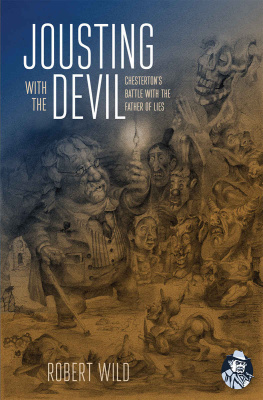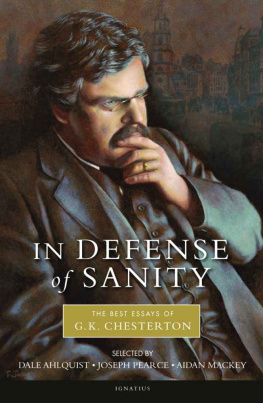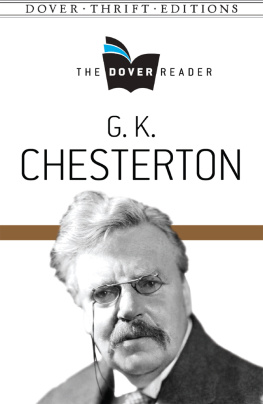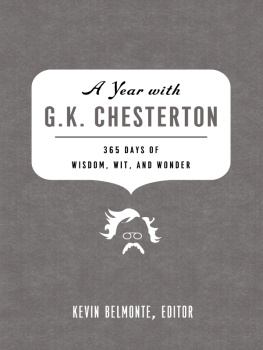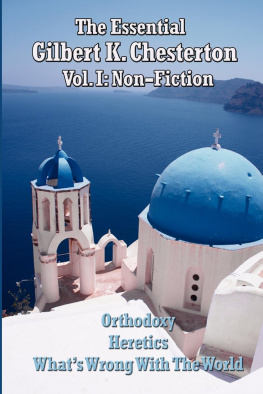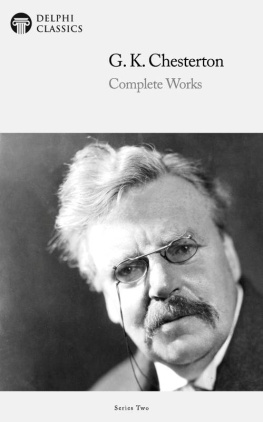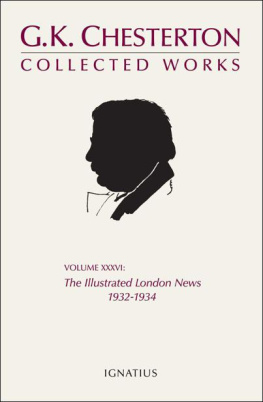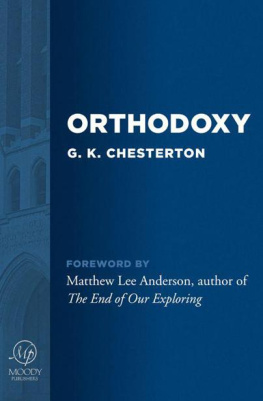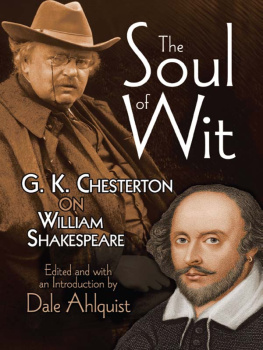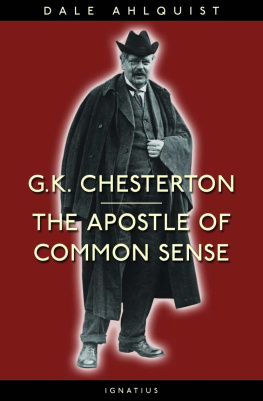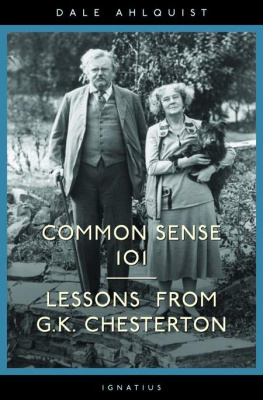The Tumbler of God
In gratitude to Aidan Mackey,
the grandfather of all modern Chestertonians,
who encouraged me to keep writing about Chesterton
ROBERT WILD
The Tumbler of God
Chesterton as Mystic
INTRODUCTION
by
Stratford Caldecott

First published by Justin Press, Ottowa, ON, 2012
Second, augmented edition, Angelico Press, 2013
Robert Wild, 2013
Introduction Stratford Caldecott, 2013
All rights reserved
No part of this book may be reproduced or transmitted, in any form or by any means, without permission.
For information, address:
Angelico Press, 4619 Slayden Rd., NE
Tacoma, WA 98422
www.angelicopress.com
978-1-62138-028-3
Cover Design: Cristy Deming
Cover Image: As I Am, by G.K. Chesterton.
From The Coloured Lands, NY: Sheed & Ward, 1938
CONTENTS
Introduction
Stratford Caldecott
Gilbert Keith Chesterton is best known today, at least in England, for the Father Brown detective stories, which were based on the character of a parish priest who received him into the Roman Catholic Church in 1922. Already in 1908, however, as a member of the Church of England, he had written a famous description of his conversion to Christian belief called Orthodoxy, which has consistently been voted one of the best books of that century. His other great religious work, The Everlasting Man (1925), was a survey of the history of the religious experience of mankind written in reply to H.G. Wells atheistic Outline of History.
As a journalist and later a newspaper editor, an illustrator, a broadcaster, a playwright, a novelist, a controversialist and social activist, Chesterton became a world-famous celebrity, and his debates with his friend, the atheist socialist George Bernard Shaw, would pack the Royal Albert Hall. But he was also a mystic, as Father Wild shows so beautifully in this book, and that makes him, if possible, even more unusual. He had what is these days called a spirituality, even though he lived in the midst of the world, and (quite often) in the midst of chaos. There is something we can all learn from him.
One of the tests of sanctity is said to be a contagious happiness and inner peace. Chesterton had his share of sorrows and of illness, and his darker moments; but more than most people he was imbued with a kind of unpretentious beatitude that tended to convey itself to those around him. The writer Franz Kafka said of Chesterton, He is so happy one might almost think he had discovered God. Indeed he had, and he was doing his best to live in the light of that discovery. What was his secret? It was to love the splendor of the real, and to live in adulthood the innocence and wonder of the child who sees
Innocence is a state that has to continually be fought for and which is continually in danger. Chesterton had a happy childhood, but, as a young man, he fell into the fashionable decadence of London at the end of the nineteenth century, dabbled in the occult and became aware of the existence of the Devil. Ultimately he was to find his way into the Catholic Church because he valued the powerthe very necessary powerof the sacrament of Confession. It is this sacrament, or rather the absolution it contains, which makes it possible for a grown man to regain the innocence he had when he was only five minutes old.
The spirituality we associate with Chesterton is also a Franciscan spirituality. In his biography of St. Francis the mystic poet, we may catch Chesterton describing an aspect of his own religious experience. But here we come upon a challenge. Is it really possible to compare the life of such a great ascetic, who attained poverty of spirit through the radical renunciation of family and possessions, with the life of a wine-bibbing reporter in Fleet Street, or a married suburbanite in Beaconsfield?
Certainly, Chesterton seemed to understand asceticism, at least in theory. For the contemplative vision, he says, reveals the world as it really is by turning it upside-down, and revealing the fragile dependence of all that seemed solid and certain upon the fine thread of the mercy of God, on which it hangs. This is the discovery of an infinite debt, of the kind that lovers delight in: we love to be in each others debt, and so to be continually paying it back. Thus the saint, who is nothing if he is not a lover, will always be throwing things away into a bottomless pit of unfathomable thanks. Men who think they are too modern to understand this are in fact too mean to understand it; we are most of us too mean to practice it. We are not generous enough to be ascetics; one might almost say not genial enough to be ascetics. A man must have magnanimity of surrender, of which he commonly only catches a glimpse in first love, like a glimpse of our lost Eden.
But while Chesterton was on no account too mean to understand asceticism, he can hardly have been said in any obvious way to have practiced it. That was not his calling. His were rather the ordinary virtues of a man in the pub who is faithful to his wife and to his friends, generous and loving to all he meets. The mysteries of the inner life and the souls intention we must leave to God, but, to some extent, we can see the fruits of a persons sanctity in the lives of those around him, whatever his walk of life. God seems to have used Chesterton not only to make others happy, but also to bring them into the Church. He was a convert who gave birth to a multitude of converts.
His mysticism was hidden, perhaps even from himself. But it consisted, I think, in what he calls a faith in receptiveness and respect for things outside oneself. He knew his existence was a gift from God, and his spirituality was one of gratitude, of thanksgiving, and of praise. This is one way, and an important way, in which we may become holy by participating in the life of the Blessed Trinity, which is the life of self-giving love, of continual receiving, and joyful giving. I would maintain, Chesterton wrote (in A Short History of England), that thanks are the highest form of thought; and that gratitude is happiness doubled by wonder.
In the fourth chapter of Heretics we read a clue as to the nature of the mystical experience that flows from such a settled disposition to gratitude:
Blessed is he that expecteth nothing, for he shall be gloriously surprised. The man who expects nothing sees redder roses than common men can see, and greener grass, and a more startling sun. Blessed is he that expecteth nothing, for he shall possess the cities and the mountains; blessed is the meek, for he shall inherit the earth. Until we realize that things might not be, we cannot realize that things are. Until we see the background of darkness we cannot admire the light as a single and created thing. As soon as we have seen that darkness, all light is lightening, sudden, blinding, and divine.
There is also, we may surmise, something inherently sociable about such a mysticism.
This is not only because we know that Our God is a society and that he commands us to love our neighbor (Chesterton adds that while we are told to love our neighbors as ourselves, we are also told to love our enemies, probably because they are generally the same people), but because such a mystic sees people as coming fresh from the hand of God, as dropping out of heaven, as full of divine mysteries, being made in the image of the Invisible and loved into existence. How could we not love them too, when we see them in this way?
For that reason, Chestertons mysticism reveals itself in his gift for friendship. He seems never to have made an enemy, and even his intellectual opponents found themselves loved, and loved him in return. All human beings, he wrote in
Next page

